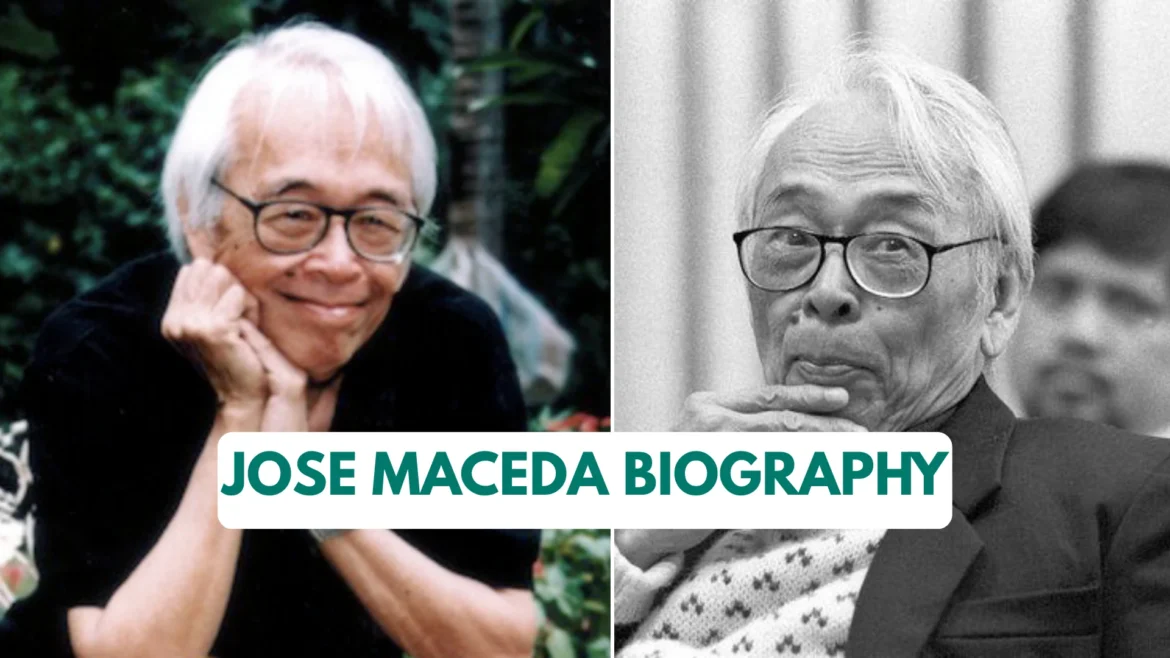José Maceda was a towering figure in 20th-century Filipino music — both as an avant-garde composer and as a pioneering ethnomusicologist.
His work blurred boundaries: he brought traditional Filipino sounds into contemporary composition, documented disappearing musical traditions, and created immersive sonic experiences that challenged Western concert norms.
Bio Data
- Full Name: José Montserrat Maceda
- Born: January 31, 1917
- Age (at death): 87
- Death: May 5, 2004
- Birthplace: Manila, Philippines
- Nationality: Filipino
- Occupation: Composer, Ethnomusicologist, Professor
Early Life and Education
José Maceda was born in the Philippines in the early 20th century. From an early age he showed a deep curiosity about sound and music. He later pursued formal training in music, which combined Western compositional techniques with a lifelong fascination for indigenous musical practices across the Philippines and Southeast Asia. Maceda’s education gave him both the technical tools of composition and the ethnographic sensitivity to value and preserve traditional music.
Career Beginnings and Ethnomusicological Work
Maceda’s career branched into two closely linked tracks: scholarly fieldwork and experimental composition. He traveled to remote regions of the Philippines, studying and recording folk songs, ritual music, and instrumental ensembles. His field recordings are now considered invaluable documents — many capture musical styles and repertories that were under threat from modernization or that had no written record.
He employed rigorous methods for collecting, cataloging, and analyzing music, but he refused to treat indigenous forms as mere museum pieces. Instead, Maceda believed these traditions were living resources that could energize contemporary composition.
Major Compositional Innovations
José Maceda became widely known for his risk-taking, large-scale sonic works. He often used nontraditional performance spaces, community performers, and extensive use of spatial sound. One hallmark was his use of repetitive, gradually shifting sonic patterns that create hypnotic group experiences — a technique resonant with minimalism but deeply rooted in his study of Southeast Asian music.
Maceda’s compositions frequently assembled large numbers of performers—sometimes dozens or hundreds—and organized them across space so sound moved through listeners. This attention to acoustic ecology anticipated later sound-art practices and immersive performance design.
Key Works
- Large-scale ensemble pieces that used traditional percussion and vocal ensembles arranged in distributed formations.
- Electroacoustic experiments where field recordings were interwoven with live performance to create temporal and cultural juxtapositions.
- Documentary and archive projects compiling field recordings from multiple Philippine islands.
His catalogue is notable both for experimental concert works and for careful scholarly outputs that contextualize the field recordings he made.
Methodology: Ethnography Meets Composition
A defining aspect of Maceda’s practice was his combined role as composer and ethnomusicologist. His ethnographic work informed his compositional palette: rhythmic structures, modal systems, and performance practices from the Philippines and neighboring regions were translated into new musical forms rather than simply quoted. He respected original contexts while creatively repurposing sonic materials.
Maceda often worked collaboratively with the communities he recorded, acknowledging them as active participants rather than passive subjects. This ethical stance resonates strongly with modern best practices in ethnomusicology.
Pedagogy and Influence
Maceda taught and mentored multiple generations of Filipino composers and scholars. His influence stretches across universities, conservatories, and community ensembles. By advocating for a music that drew from local traditions rather than imitating foreign styles, Maceda helped create a distinctly Filipino contemporary music identity.
Internationally, Maceda’s blending of fieldwork and avant-garde composition attracted attention from composers, ethnomusicologists, and sound artists. His explorations of spatialization and massed performers are referenced by artists experimenting with site-specific sound and participatory music.
Awards and Recognition
Across his career, Maceda received recognition for both his academic and creative contributions. His fieldwork earned archival respect, while his innovative concerts gained critical acclaim in experimental music circles.
Legacy and the Maceda Archive
One of Maceda’s most enduring legacies is the corpus of field recordings, transcriptions, and writings he left behind. These materials continue to be studied and performed by musicians and researchers. The archival value of Maceda’s work is immense: for many communities his recordings are one of the only preserved records of their traditional music.
Beyond archives, his philosophical approach — treating music as a social, ecological, and cultural practice — continues to shape how composers and ethnographers think about sound.
Why José Maceda Matters Today
In a global era where local traditions confront rapid social change, Maceda’s work offers a model: rigorous documentation, respectful collaboration, and creative adaptation. His practice demonstrates how a composer can both preserve and extend tradition, producing works that are locally rooted yet globally resonant.
Conclusion
José Maceda’s life bridged worlds. As a fieldworker, he saved fragments of musical history; as a composer, he invented new ways of hearing and participating in sound. His biography is more than a chronology of events — it’s a map of a lifelong project to honor and amplify the musical voices of the Philippines and Southeast Asia.
Frequently Asked Questions
Who was José Maceda?
José Maceda was a Filipino composer and ethnomusicologist known for his field recordings of Philippine traditional music and his experimental, large-scale compositions that often used spatialized sound and community performers.
What is José Maceda famous for?
He is famous for blending ethnographic fieldwork with avant-garde composition, creating immersive works and preserving traditional Philippine musical forms through extensive field recordings.
Did Maceda compose using Western musical techniques?
Yes, he used Western compositional techniques but fused them with indigenous rhythmic and modal practices derived from his fieldwork.
Where can I find Maceda’s recordings?
Many of his field recordings are preserved in archives, university collections, and specialized music libraries. Search institutional archives or ethnomusicology departments for specifics.
How did Maceda influence contemporary music?
He influenced composers and sound artists interested in spatialization, community-based performance, and integrating fieldwork into composition.
Is José Maceda’s work still performed today?
Yes — both his concert works and his field recordings continue to be performed, studied, and reinterpreted by musicians and scholars globally.




